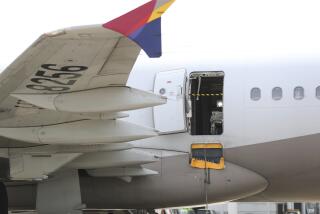Radiation detected on airline passengers from Japan
- Share via
Higher-than-normal levels of radiation have been detected on the clothes of airline passengers arriving in South Korea and Taiwan from Japan, although the levels did not appear to be high enough to be dangerous and the passengers did not appear to be ill, wire services reported Thursday.
Radiation was detected on a Japanese man from Fukushima prefecture, where the damaged nuclear reactors are located, arriving at Incheon International Airport in Seoul, Yonhap News Agency reported.
The radiation level detected was 1 microsievert and was located on the man’s coat and shoes, Yonhap reported; the abnormal radiation levels disappeared once the coat and shoes were taken off. Kyodo News Agency reported that the South Korean government considers any radiation level above 1 microsievert as “abnormal.”
By comparison, a full-body airport X-ray scanner provides 0.0148 microsieverts of radiation, a chest X-ray provides 100 microsieverts of radiation, and a CT scan of the abdomen will provide 8,000 microsieverts. A dose of about 500,000 to 1 million microsieverts will cause radiation sickness.
Only if radiation levels are greater than 100 microsieverts will passengers be directed for a full medical checkup, Yonhap reported; those with lower levels of radiation will be told how to decontaminate themselves.
Reuters quoted a Taiwanese government official as saying that 25 passengers had arrived from Japan and had “slightly higher” levels than normal.
Two of those with the higher-than-normal radiation levels worked for the same company at its branch office in Fukushima prefecture, the Central News Agency in Taiwan reported.
“I was not very surprised as I live only around [43 miles] from the Fukushima Daiichi nuclear power plant, where the explosion took place,” one of the Taiwanese passengers arriving at Taiwan Taoyuan International Airport near Taipei was quoted as saying by the Central News Agency.
Passengers on flights arriving at Los Angeles International Airport were also being scanned for radiation.
And in Chicago, Mayor Richard Daley said passengers on a flight from Tokyo set off radiation detectors at O’Hare International Airport, but had no details, the Chicago Tribune reported.
In general, people who are contaminated with radiation cannot give radiation illness to other people, unless a person has “ingested a great deal of a radioactive substance -- enough to make you sick,” said Elmer E. Lewis, professor emeritus at Northwestern University and author of two textbooks on nuclear power.
Related: Animated map shows radioactive material’s path across Pacific toward California
Small amounts of radiation headed for California but no health risk seen
Q&A;: Radiation risks and potassium iodide
More: Articles, videos and graphics on radiation exposure, nuclear crisis
More to Read
Sign up for Essential California
The most important California stories and recommendations in your inbox every morning.
You may occasionally receive promotional content from the Los Angeles Times.














